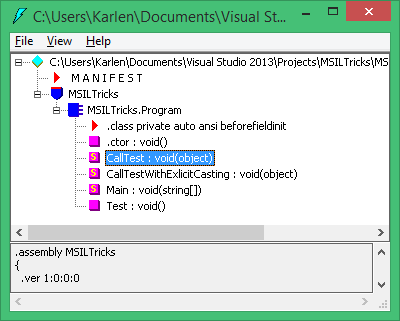The runtime topic of the .NET platform has been discussed for many times, while JIT itself, as well as a resulting code and interoperability with the execution environment, have not.
We will explore a rationale for the lack of inheritance in structs, unbound delegate roots, as well as a technique of invoking any method without reflection.
Genesis of Value-types
Structs in the .NET framework are plain old structures (in terms of layout, mutability, etc.). They support OOP and .NET, the inheritance from System.ValueType, which is derived from System.Object, etc.).
To better understand why structs cannot be derived from other types, it is necessary to dig into CLR’s method organization.
Instance-level methods have an implicit argument ‘this’, which is explicit indeed. While compiling a code, JIT creates the following signature:
ReturnType MethodName(Type this, …arguments…)
However, it is for reference types only.
As for value types, it has the following signature:
ReturnType MethodName(ref Type this, …arguments…)
This is done to support mutability for structs, i.e. so that we can modify this pointer.
So, why is it impossible to derive structs from other types?
Suppose we have a virtual method of a base reference class. What should a compiler do in this case? Nothing. Constantly guessing and generating different code specializations (with either byval or byref semantics) in addition to vtable dispatch is ineffective. Also, we are adding boxing, which is required to correctly dispatch virtual method.
But… the ToString, GetHashCode, and Equals methods are virtual methods of the parent System.Object class (a reference type).
They are exceptions. JIT knows about them and generates binding and specialization only for these methods.
Unbound Delegates
Reflection in the .NET framework allows us to create a delegate for both static and instance-level methods. However, there is a small issue – it is necessary to create a new delegate per object’s instance.
Consider the example:
class Program
{
static void Main(string[] args)
{
var calc = new Calc() { FirstOperand = 2 };
var addMethodInfo = typeof(Calc).GetMethod("Add",
BindingFlags.Public | BindingFlags.Instance);
var addDelegate = (Func<int, int>)Delegate.CreateDelegate(
typeof(Func<int, int>),
calc,
addMethodInfo);
Console.WriteLine(addDelegate(2)); // 4
}
}
class Calc
{
public int FirstOperand = 0;
public int Add(int secondOperand)
{
return FirstOperand + secondOperand;
}
}
In order to do this, you need to use unbound delegates. However, they have one feature – a different signature, where an additional argument is prepended – a reference to an instance.
Thus, unbound delegates are the references to a real method.
As you can see, the Add(int secondOperand) signature will turn into the Add(Calc this, int secondOperand) signature.
Let’s check it:
class Program
{
static void Main(string[] args)
{
var addMethodInfo = typeof(Calc).GetMethod("Add",
BindingFlags.Public | BindingFlags.Instance);
var addDelegate = (Func<Calc, int, int>)Delegate.CreateDelegate(
typeof(Func<Calc, int, int>),
null,
addMethodInfo);
Console.WriteLine(addDelegate(new Calc(), 2)); // 2
}
}
class Calc
{
public int FirstOperand = 0;
public int Add(int secondOperand)
{
return FirstOperand + secondOperand;
}
}
Now declare the Calc type as struct and run the code again. ArgumentException would be thrown.
But we need to pass this byref argument to Func<Calc,int,int>.
How to do this?!
First, declare the FuncByRef delegate:
delegate TResult FuncByRef<T1, in T2, out TResult>(ref T1 arg1, T2 arg2);
Now, change the code again:
class Program
{
delegate TResult FuncByRef<T1, in T2, out TResult>(ref T1 arg1, T2 arg2);
static void Main(string[] args)
{
var addMethodInfo = typeof(Calc).GetMethod("Add",
BindingFlags.Public | BindingFlags.Instance);
var addDelegate = (FuncByRef<Calc, int, int>)Delegate.CreateDelegate(
typeof(FuncByRef<Calc, int, int>),
null,
addMethodInfo);
var calc = new Calc();
calc.FirstOperand = 123;
Console.WriteLine(addDelegate(ref calc, 2)); // 125
}
}
struct Calc
{
public int FirstOperand;
public int Add(int secondOperand)
{
return FirstOperand + secondOperand;
}
}
Verification evasion
Consider a simple application:
class Program
{
static void Main(string[] args)
{
CallTest(new object());
CallTestWithExlicitCasting(new object());
Console.Read();
}
static void CallTest(object target)
{
Program p = target as Program;
p.Test();
}
static void CallTestWithExlicitCasting(object target)
{
Program p = (Program)target;
p.Test();
}
public void Test()
{
Console.WriteLine("Test");
}
}
As you can see, the application will exit with NullReferenceException when calling CallTest().
Well, let’s fix this situation by running ildasm.
Visual Studio Command Promt -> ildasm

Then,
File -> Dump -> Save as dialog -> msiltricks_patch.il
Open the stored file msiltricks_patch.il in any text editor and find a body of the CallTest method:
.method private hidebysig static void CallTest(object target) cil managed
{
// Code size 14 (0xe)
.maxstack 1
.locals init ([0] class MSILTricks.Program p)
IL_0000: ldarg.0
IL_0001: isinst MSILTricks.Program
IL_0006: stloc.0
IL_0007: ldloc.0
IL_0008: callvirt instance void MSILTricks.Program::Test()
IL_000d: ret
} // end of method Program::CallTest
Delete the IL_0001: isinst MSILTricks.Program line, i.e. isinst operator invocation (the as operator in C#).
The same should be done to the CallTestWithExlicitCasting method:
.method private hidebysig static void CallTestWithExlicitCasting(object target) cil managed
{
// Code size 14 (0xe)
.maxstack 1
.locals init ([0] class MSILTricks.Program p)
IL_0000: ldarg.0
IL_0001: castclass MSILTricks.Program
IL_0006: stloc.0
IL_0007: ldloc.0
IL_0008: callvirt instance void MSILTricks.Program::Test()
IL_000d: ret
} // end of method Program::CallTestWithExlicitCasting
Delete the IL_0001: castclass MSILTricks.Program line, i.e. castclass operator invocation (the cast operator in C#).
Visual Studio Command Promt -> cd [your saved file dir]
Visual Studio Command Promt -> ilasm msiltricks_patch.il
Run msiltricks_patch.exe.
НThus, there are no exceptions, even AccessViolationException.
The thing is that our Test method does not have side effects and does not use this in its body.
Conclusion
We work with hardware. Variables of reference types are just addresses in memory – DWORD. Casting types is nothing more than abstraction and protection at the compile time. The CPU works with memory addresses only. CLR provides these addresses while JIT compiles code using them.
By the way, callvirt instruction does not check for correctness of an object. For example, to get AccessViolationException just add a virtual method to the Program class and call it in the Test method’s body.